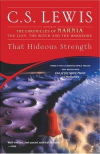
That Hideous Strength
(Book 3 of the Space Trilogy)
by C.S. Lewis
Short Review
Read If: you enjoy retellings of classic myth, you are looking for some science-fiction based philosophy (or vise versa), you enjoy bears (the animals)
Don't Read If: you abhor Christian allegory, you find descriptions of British academicia dull, you are Philip Pullman
Long Review
Possibly a bad idea to start a review blog with the third book in a trilogy, but here goes nothing! This book can technically be read on its own, but I would not recommend it, as it frequently makes references to the previous two books and would be a much more confusing read if you did not have the backstory. Anyway, on to the book itself. Possibly Lewis' most complex work, That Hideous Strength is the story of an immoral new corporation looking to destory the world as we know it, and the small group of rightous folk (backed up by pseudo-omnicient space entities) who band up against them. The book is deliciously well-written, with poetic descriptions and long, interesting points of philisophical discussion. I found the plot to be enjoyable, if not terribly deviant in its ultimate "Good conquers Evil" finale.
The central character in the story is Jane, a disaffected scholar and housewife (who also has visions). It was honestly refreshing, at first, to have Lewis focus on a realistic and progressive female character! However, the glimmering promise of a strong female character written by Lewis was not to last. By the end of the novel, Jane has learned that her enlightened individualistic days are morally bankrupt, and true happiness only comes from being an obedient Christian wife. Yes, you can gag. Lewis, a bachelor for most of his life, is very much a man's man in the sense that women are so foreign to him that he feels the need to either ignore their existance or place them in a context wherein they can complement his severely WASP viewpoints -i.e. supportive wives to his male characters. He is all but obsessed with the "masculine," even going so far as to state that God is such a pure form of masculinity that we are all feminine in comparison. This is certaintly no departure from Lewis' other works, but it was disheartening to have it beaten in so soundly.
Another aspect of this trilogy that I found disconcerting was the focus on the violence by which the good guys vanquished the evil-doers. For someone who claims to have a Christian viewpoint, the moral given by these books is that evil can only be defeated by submitting yourself wholey to God and beating the utter CRAP out of any bad person in the most violent and painful methods possible. Hmm, on second thought, looking at history I guess this is a fairly predominant Christian viewpoint. But I feel as if Lewis was capable of better. There is little to no hope of any redemption or actual conversion here; people seem to be naturally geared towards good or evil, and the good people always progress into better and better people, while evil people must die. Which feels out of place inside Lewis' extremely philosophical discourse; much of this book involves discussion of religion, faith, morality, and other high-minded and, franky, interesting ideas. However, the story itself seems to be pulled between being a highly original and thought-provoking exploration into modern society and religion told through a science-fiction story, or just being a stereotypical action-adventure tale. It accomplishes both variations well, but neither to true excellence.
Honestly, this book is a very good read if one can get past the heavy-handed Christian allegory and anti-feminist themes. It has many witty and fun moments, and an interesting plot involving zombie heads, psychic space-beings, Arthurian legend, and philosphical discourse. Overall, I believe this trilogy is worth taking a look at, especially if you enjoyed the Chronicles of Narnia and want a more adult and sci-fi based series by Lewis. The series also offers an interesting comparison to works by other authors, such as Tolkien and Pullman, who act as either companion pieces or rebuttal pieces to a lot of the ideas Lewis brings forth in That Hideous Strength. In fact, there's a lot more I could say about this series, which in itself makes it a worthy read to me. Anything that can keep me interested and make me think deserves a place on my bookshelf.

No comments:
Post a Comment